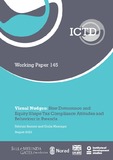| dc.contributor.author | Santoro, Fabrizio | |
| dc.contributor.author | Mascagni, Giulia | |
| dc.date.accessioned | 2022-08-17T14:20:25Z | |
| dc.date.available | 2022-08-17T14:20:25Z | |
| dc.date.issued | 2022-08 | |
| dc.identifier.citation | Santoro, F. and Mascagni, G. (2022) Visual Nudges: How Deterrence and Equity Shape Tax Compliance Attitudes and Behaviour in Rwanda, ICTD Working Paper 145, Brighton: Institute of Development Studies, DOI: 10.19088/ICTD.2022.011 | en |
| dc.identifier.uri | https://opendocs.ids.ac.uk/opendocs/handle/20.500.12413/17602 | |
| dc.description.abstract | The empirical evidence on the drivers of compliance is expanding quickly, but there is less
evidence from low-income countries. Mass-media communication channels are a cheap
option that budget-constrained revenue administrations can use to communicate with
taxpayers. However, very little is known about the effectiveness of such tools in improving
compliance. This paper starts to address this gap by testing the impact of two short animated
videos on tax matters – one focusing on deterrence and the other on equity – that were used
in a survey experiment. Using a unique dataset of survey and administrative data from
Rwandan taxpayers, we are able to measure the impact on compliance perceptions and
behaviour. We document two significant results. First, both videos are effective in improving
perceptions around enforcement and equity. Second, only the deterrence video translates
into more tax being remitted – the equity appeal fails to raise more revenue. We investigate
the mechanisms behind this response, and show that prior behaviour of taxpayers might
explain the different responses to our deterrence and equity treatments. Our intervention is
highly cost-effective and easily scalable. | en |
| dc.language.iso | en | en |
| dc.publisher | Institute of Development Studies | en |
| dc.relation.ispartofseries | ICTD Working Paper;145 | |
| dc.rights.uri | http://creativecommons.org/licenses/by/4.0/ | en |
| dc.subject | Governance | en |
| dc.title | Visual Nudges: How Deterrence and Equity Shape Tax Compliance Attitudes and Behaviour in Rwanda | en |
| dc.type | Other | en |
| dc.rights.holder | © Institute of Development Studies 2022 | en |
| dc.identifier.team | Governance | en |
| dc.identifier.doi | 10.19088/ICTD.2022.011 | |
| rioxxterms.version | VoR | en |
| rioxxterms.versionofrecord | 10.19088/ICTD.2022.011 | en |


